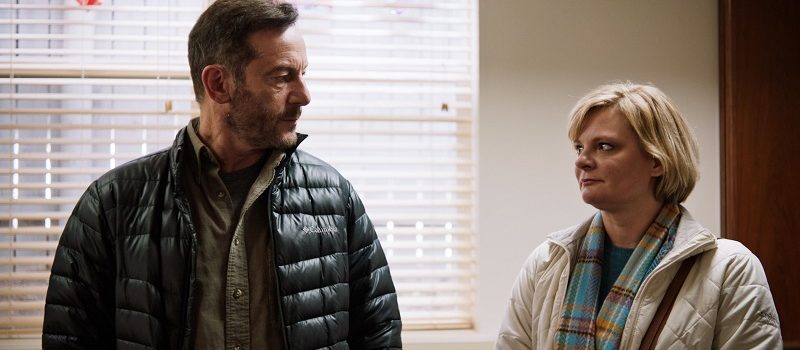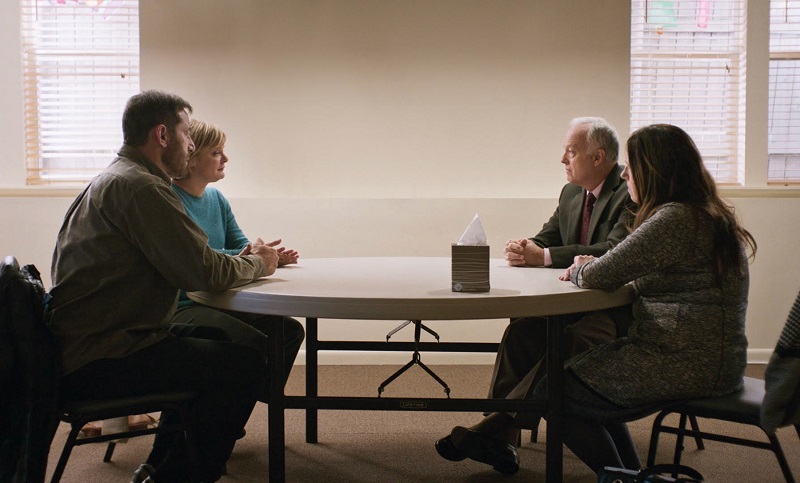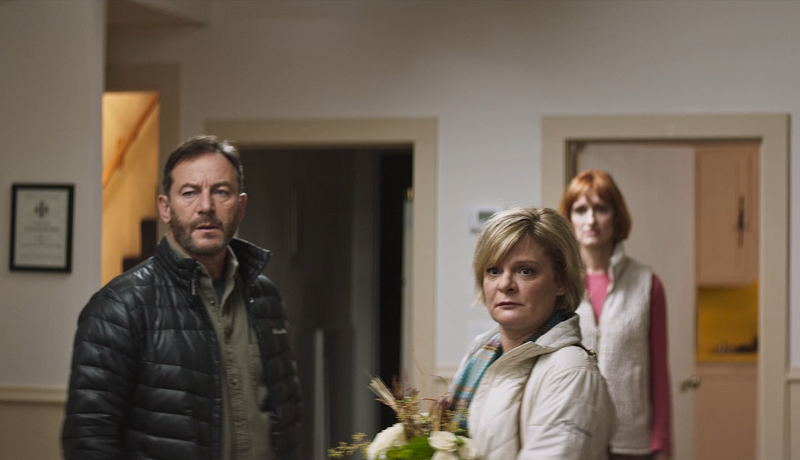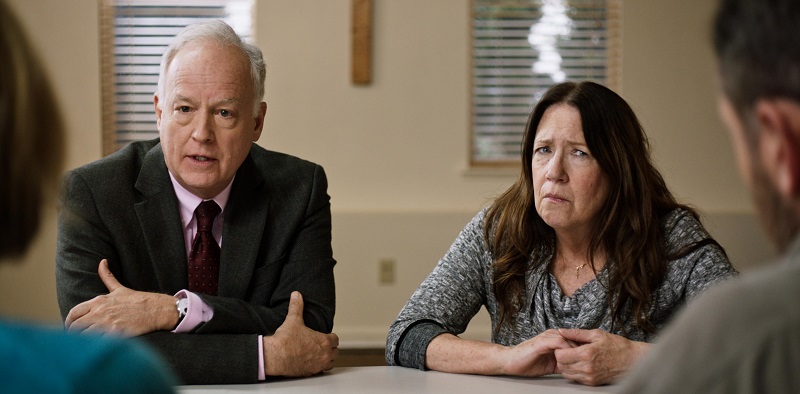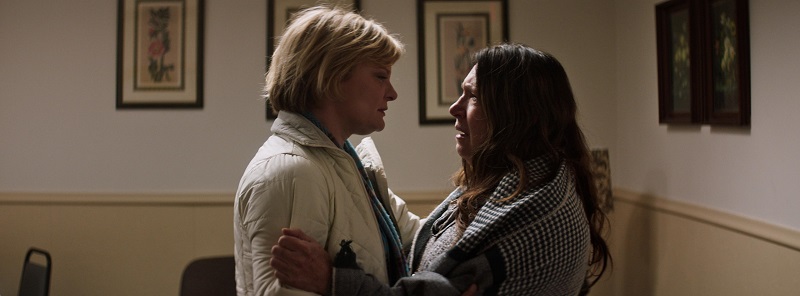Two couples, four parents, united by an unthinkable tragedy that has led to questions, anger, and most of all—an emotive powerhouse that is what happens when the parents of the shooter and the mom and dad of a victim of a school shooting meet in a New England church.
We get the impression that some kind of time has passed. Investigations and detailed accounts are provided, almost memorized by all those involved. So, it appears that the authorities have done their due diligence after the child of Linda (Ann Dowd) and Richard (Reed Birney) went into a high school and exploded a bomb in a classroom and then shot and killed a total of ten students, including the son of Gail (Martha Plimpton) and Jay (Jason Isaacs).
As the film commences, Gail and Jay have arrived first. Gail doesn’t want to do it, she doesn’t want to go in. We’re not sure why because writer-director Fran Kranz hasn’t unveiled all his cards yet. In fact, that is one of the most devastating of Mass’ many moments of a gut-wrenching emotive cull. We know these are important people, due to how the church employees were acting as the film truly begins as they set up for this meeting of four people, sitting around a table in a church meeting room. Eventually, Gail and Jay go in and are shown to the room. Their feeling is palpable, but we’re not quite sure what emotion it is, and that is brilliant.
Even as Linda and Richard arrive and present Gail with flowers, the viewer is not so sure what this get-together is all about. Things start to get clearer when Linda asks to see the pictures of Gail’s son she discussed bringing but has no interest in seeing the photos Linda brought of her boy. As these four talk in what could double as a cinematic stage play, the quartet of actors elevate already electric material to a place that will not leave your heart for weeks, maybe months. The discussion goes from pleasantries to details in a perfectly timed manner. As the reality of what happened starts to become clear, Kranz’s script shows its true power.
We are fed information slowly but surely and it all adds up to a powder keg that the viewer just knows is going to explode. Or does it?
The idea of parents of a victim of a school shooting meeting with the parents of the shooter is a fascinating one and to say it’s timely is an understatement. There is practically a school shooting every week in America since Columbine first put the sick notion in our brains. With Mass, we get both sides of this issue, something that is extremely brave of the filmmaker to illustrate. Because whether we like to admit it or not, there are two parents somewhere mourning a child that was a mass murderer, yes, but their son, nonetheless. One day he was there, the next, he was solitarily laying in a pool of blood in the school library.
At first, Gail and Jay don’t want to hear it. Their son is a monster. Period. What he did. How he did it. How it was planned and most importantly, executed will ring through this small New England church room with four actors working at the top of their game as they navigate the minefield that is this issue. Looking at the two people in the face, who created this evil who wiped out so many lives is one done in hopes of answers. Whether the parents of the shooter will have answers, is not clear. Were there signs? When did his fascination with violence go from innocent to proactive? These are just a few of the questions lodged at Linda and Richard. Are they defensive? Yes, at times. Other times, they are pleasantly understanding. Again, after all, they are mourning too.
The four thespians are each fantastic. But the star here, by a hair, has to be Dowd. She instantly deserves some serious Oscar consideration for Best Supporting Actress, as does Isaacs for his turn. Dowd plays Linda as soft-spoken, concerning, full of heart—but at the same time, she is defensive about her son and more importantly, how she and her husband raised him. It’s an important role because as she tells stories about her boy growing up and even the last few years, there seem to be clues to his future actions that Gail and Jay pounce on, but as his parent, it is shown it can be easy to miss. As Dowd plays her, it is simultaneously heartbreaking and actually creates more questions. The actress delivers a steady performance that rolls through an emotive landscape that is ripe with landmines. She navigates them all and by the close of the film, you will never look at the awful entity that is school shootings the same way again.
Isaacs has moments that are just inspiring. There is a moment where he shouts, “Your son killed my boy!” and it will reduce you to nothing but a sobbing mess. The way in which the actor navigates this minefield over the course of two hours is a clinic in the thespian arts. Isaacs and Plimpton are perfect together and are every bit the couple going through what can only be defined as hell. They may never get answers to their questions, but this meeting may do something they never expected. It may provide more questions. It may provide no answers. But it is an important step in healing, something we all need after tragedy—at least at some point.
Plimpton is reserved, but explosive when she needs to be—it is extra painful to witness a mother talk about a child that is no longer with us, particularly when taken from the earth so violently and evilly. The actress deserves major kudos for her role, and let’s hope her searing work in Mass will lead to her being cast in much more than she has been.
Birney plays Richard as someone who is utterly defensive and uses phrases like, “I will not be forced to defend my parenting!” with such power that one can feel the despair meets denial. Both he and Dowd make a powerful team, each bringing something unique to this dynamic that adds countless layers of intensity to the entire endeavor.
It all adds up to something slightly unexpected. But then again, how does one expect a story like this to conclude? How do you end a story like this, when the characters at the heart of it will be dealing with this tragedy for the rest of their lives? Kranz has penned an instant classic that is the definitive take on this issue for our time. One never sees the two sides to this story on the evening news, but through Mass, it becomes crystal clear that the entire horrorshow is not black and white.
Grade: A

